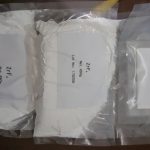Zirconium fluoride is white crystal or powder. It is insoluble in water, however soluble in hydrofluoric acid. Zirconium tetrachloride is the raw material.
- Zirconium Fluoride
Zirconium Fluoride
| CAS No.:7783-64-4 | EINECS No.:232-018-1 | Molecualr Formula:ZrF4 | Molecular Weight:167.21 |
| Melting Point:640℃ | Refractive Index:1.59 | Density:4.6 | UN 3260 8/PG 2 |
Applications
Zirconium tetrafluoride is mainly for optics.

